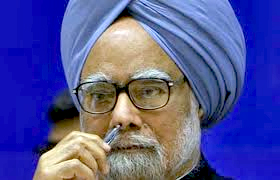New Delhi, Apr 15: In its final arguments in the 2G spectrum allocation case, the Central Bureau of Investigation (CBI) on Wednesday told the Special Court that ex-telecom minister A Raja had misled then PM Manmohan Singh on policy matters pertaining to 2G spectrum allocation.
The CBI also said 2G spectrum was granted to ineligible companies such as Swan Telecom Pvt Ltd and Unitech Wireless.
 The investigating agency also alleged that A Raja had deliberately advanced the cut off date to favour accused firms in 2G allocation.
The investigating agency also alleged that A Raja had deliberately advanced the cut off date to favour accused firms in 2G allocation.
Former Telecom Minister A. Raja, DMK MP Kanimozhi and others, including top corporate executives, are facing trial in the case. In its charge sheet, CBI had alleged that there was a loss of around Rs 31,000 crore to the exchequer in the allocation of 122 licences for 2G spectrum.
CBI had alleged that there was a loss of Rs 30,984 crore to the exchequer in allocation of 122 licences for 2G spectrum which were scrapped by the Supreme Court on February 2, 2012.
The court has recorded statements of 154 CBI witnesses, including Reliance ADAG Chairman Anil Ambani, his wife Tina Ambani and former corporate lobbyist Niira Radia, running into over 4,400 pages in the case.
Besides Raja and Kanimozhi, former Telecom Secretary Siddharth Behura, Raja's erstwhile private secretary R K Chandolia, Swan Telecom promoters Shahid Usman Balwa and Vinod Goenka, Unitech Ltd MD Sanjay Chandra, three top executives of Reliance Anil Dhirubhai Ambani Group (RADAG) -- Gautam Doshi, Surendra Pipara and Hari Nair -- are facing trial in the case.
Directors of Kusegaon Fruits and Vegetables Pvt Ltd Asif Balwa and Rajiv Agarwal, Kalaignar TV Director Sharad Kumar and Bollywood producer Karim Morani are also accused in the case.
Besides these 14 accused persons, three telecom firms -- Swan Telecom Pvt Ltd (STPL), Reliance Telecom Ltd and Unitech Wireless (Tamil Nadu) Ltd -- are also facing trial in the case.
The court had on October 22, 2011, framed charges against them under various provisions of the IPC and the Prevention of Corruption Act dealing with offences of criminal conspiracy, cheating,forgery, faking documents, abusing official position, criminal misconduct by public servant and taking bribe.
The offences entail punishment ranging from six months in jail to life imprisonment.
The court had earlier said that out of 17, seven accused had not wished to lead evidence in their defence.
It had said Vinod Goenka, Swan Telecom (P) Limited (now Etisalat DB Telecom (P) Limited), Gautam Doshi, Reliance Telecom Ltd and Kanimozhi had mentioned in their statement under section 313 CrPC itself that they do not wish to lead defence evidence.
Later on, co-accused Balwa and Morani, who had earlier desired to lead defence evidence, did not examine any witness and their statements were recorded accordingly, the court had observed.
The court is also trying separate cases arising out of the probe into the 2G scam which allegedly involves promoters of Essar Group, Loop Telecom and others, Aircel-Maxis deal case and Enforcement Directorate's money laundering case.





Comments
Add new comment